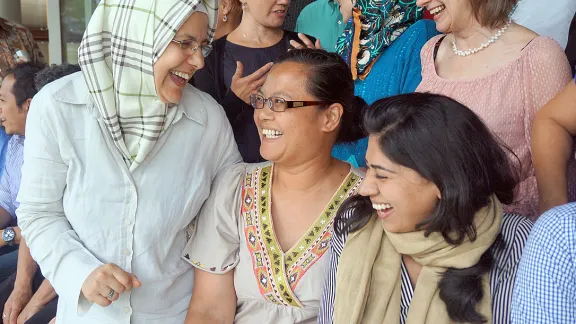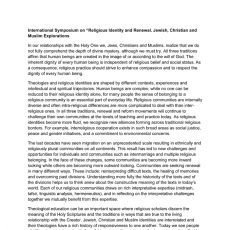
Participants of the Seattle Interfaith Conference discussing reform and renewal in different religious contexts. Photo: LWF/ I. Benesch
Reconcile Accountability to God, Religious Authorities and Society
(LWI) - “We cannot consider the future of our own faith community in isolation from others; our communities are closely related and the future of life in dignity is a shared concern.” This was affirmed by an international, interreligious symposium on religious identity and renewal today.
The conference, sponsored by the Lutheran World Federation and the School of Theology and Ministry at Seattle University, 10—14 August 2014, engaged thirty Jewish, Christian and Muslim scholars from various traditions in lively and thought-provoking discussions. The papers presented topics such as identity, memory, sacred texts and revelation, and religious life in the twenty-first century. In light of sectarian hostilities between religious communities, participants urged the religious leadership to oppose the use of violence in the name of religion and instead to strengthen values of dignity, compassion and solidarity.
Religious Practice More “Than Reconstructing Positions”
In his keynote address, Dr John Borelli, Georgetown University, USA, outlined the beginnings of Christian engagement in interreligious dialogue in the 1960s and looked at the future of religions in the twenty-first century. Borelli concluded that “as a result of those changes [Vatican II] dialogue became a defining factor of Christian identity.”
Describing the developments within the Reform movement in Judaism, Rabbi Dr David Fox Sandmel, director for interfaith affairs, Anti-Defamation League, New York, USA, noted that “both the Conservative and Reform definitions of Torah reflect the desire to preserve the centrality of Torah while remaining open to contemporary critical scholarship. In practical terms, this position presents challenges to religious authority and therefore to maintaining standards of belief and practice within the Reform and Conservative communities.”
Prof. Mouhanad Khorchide, Center for Islamic Theology, University of Muenster, Germany, emphasized the centrality of God’s mercy in Islamic theology which is “the foundation for a dialogical relationship between God and humanity.” This leads to new ways of understanding and living out the Qur’anic message. Muslims are called not to “remain stuck at the level of pure reconstruction of existing positions since this would essentially kill Islam.” Khorchide suggests that religious practice in Islam “is not just limited to ritual duties but also encompasses active commitment to human dignity, to respecting the other and to establishing justice.”
Religions Accountable to Society
The political scientist, Prof. Turan Kayaoglu, University of Washington, Tacoma, USA, noted that in the Muslim community traditional religious authorities have become weaker and that in the modern state and through globalization and the new media the religious voice has become diversified and fragmented. He described challenges and opportunities of this new “heteroarchry.” He pointed to four different religious authorities: the local imams, the chaplains in institutions, the new Muslim intellectuals and the internet. He stressed that in order to live together peacefully people of faith need to recognize that in their religious practice they are not only accountable to God and their religious authorities but to society at large.
Dr Herbert Moyo, School of Religion, Philosophy and Classics at the University of KwaZulu-Natal, South Africa, emphasized that in Africa “the future of Christianity lies in its ability to respond to socioeconomic and healing needs of Africans.” He described how multiple forms of Christianity are taking shape in Africa. This raises the question as to who authenticates which voice is the right voice at a given time and Moyo concluded that it is crucial for the religious voice to be life affirming.
Critical Self-Examination
Summarizing the reflections on renewal within the three religions, Prof. Kajsa Ahlstrand, University of Uppsala, Sweden, pointed to four shifts in religiosity namely “from the individual going to heaven to living together on earth; from external to internal authority; from obedience to empathy; and from hierarchical to mutual relationships.” She argued that whereas in the Middle Ages Aristotelian philosophy had provided a conceptual framework for the intellectual interaction between three traditions, a new conceptual framework is emerging today within which the acceptance of diversity and compassion for the vulnerable has become the shared concern of people of different faiths.
Participants were concerned that while there are those who embrace religious diversity, others are becoming more hostile toward people of other faith. As Rabbi Dr Shira Lander, director of Jewish Studies at Southern Methodist University, Dallas, USA, underlined “religious communities have inherited problems from the past that are strong obstacles to the future; universalistic triumphalism is one of them.” Moreover, Lander noted that in order to envision the future, religious communities need critical self-examination and “to learn how to express their core ethical values in non-particularistic language.”
In her concluding remarks, Rev. Dr Simone Sinn, LWF Department for Theology and Public Witness, stressed that “as the symposium had provided space for joint analysis and joint theological reflection between Jews, Christians and Muslims it has modeled how we can be mutually accountable in our theological reflections.” She pointed out that “as Lutherans reflect on their identity in light of the Reformation Anniversary such interreligious conversation can deepen their understanding of renewal.”
The symposium was co-organized by Rev. Dr Sinn, LWF, and Dr Michael R Trice and Rabbi Anson Laytner of the School of Theology and Ministry, Seattle University, USA.
More from the Symposium | More About the Event



